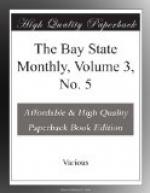* * * * *
THE MARCH OF THE SIXTH REGIMENT.
By Rev. Charles Babbidge, Chaplain.
Should a motto ever be needed for some prospective medal commemorative of the “Old Sixth Reg.” none would seem to be more appropriate than a quotation from Virgil,—“Primus tentare viam.” Though but little honor attaches to being first, where all were equally ready to be foremost, still, the “chances of war” gave some little advantage to this fortunate military body. Its ready re-response to the call “To Arms,” served to awaken a similar enthusiasm in all the other military organizations of the Commonwealth. The admirable state of discipline to which the regiment had been brought by its accomplished and efficient commander, Col. Edward F. Jones, and his subordinate officers, was fully competent to secure the respect and confidence of the multitudes of patriotic citizens with whom it came in contact after leaving Massachusetts; and it is only doing justice to the soldiers of this regiment to say, that amid all the excitement of the commencement of a campaign, and all the flattering attentions and entertainments which they received from every quarter, and on all occasions, they maintained the solid, steady deportment of soldiers well trained, of citizens accustomed to good society, and of patriots ready and willing to do whatever these qualities imply and require.
It can hardly be said that “the order to march” came unlooked for, though it most certainly was sudden. The tender of the services of the regiment had long since been in the hands of Gov. Andrew; meetings of the field and staff officers had been held; there was a free and thorough interchange of opinions and sentiments among the line officers; and not a single soldier could be found who had not fully digested all the particulars of a possible future.
The ready response of our citizen-soldiers to the call of the governor furnishes an apt illustration of the peculiar character of our people. Under a government that requires the constant maintenance of a strong military force, “General Orders” would have been issued to the various camps and garrisons scattered throughout the country. When danger threatened us it became manifest at once, that every peaceful village was a garrison, and every city a fortified camp. It was often a subject of merriment while we, like Christopher North were “under canvas,” to relate the particular circumstances of time, place, and occupation at the moment when each of us found himself suddenly transformed into a soldier. Each had his story to tell of his numerous “hair’s breadth escapes,” as through mud, snow and darkness he made his way to the appointed rendezvous, on the morning of April 16th.
In Lowell the regiment paraded in Huntington Hall, and there received a cordial welcome from the people of that city. Taking the cars we arrived in Boston about noon, and were assigned quarters in one of the armories in Faneuil Hall. With a view to better accomodations, the regiment in the afternoon marched to Boylston Hall, and there prepared for as comfortable a bivouac as circumstances permitted.




